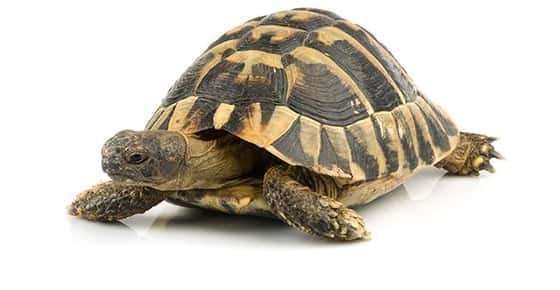
Tortoises can make an interesting pet, although they can present a challenge, due to their size and dietary habits. Their diets vary based on species, but all need quite a variety of foods, with careful attention paid to the amount of roughage as well as calcium/phosphorus balance. Some species have voracious appetites, too. Many species are fairly large and need a decent sized enclosure, preferably outdoors, so are suited to areas with nicer climates. Depending on the temperatures where the tortoise originates and the area where you live, it may be necessary to bring tortoises indoors overnight or during cooler weather (and with the larger tortoises providing indoor housing can be a big challenge!). Some species need to hibernate, which can be very stressful on the tortoise and requires special conditions.
Tortoises can also live a very long time (anywhere from 50 to over 100 years), which means you must be prepared to provide a lifetime of care and consider that your pet might even outlive you.
A couple of important notes: when constructing an outdoor pen, make sure it is strong and bury your fences if you have a burrowing tortoise. Tortoises are quite strong, especially the larger ones, and flimsy enclosures won't hold them long. Some tortoises also climb surprisingly well so some may require a roofed pen. It is also very important to make sure the enclosure keeps predators (including dogs) out. Make sure there are no dangers in the pen - no poisonous plants, shallow water only, and no sharp objects or small inedible objects which may be accidentally ingested. Also for some tortoises, trying to climb steps or other obstacles can result in them tipping onto their backs, which may result in their untimely deaths. Most will need some sort of shelter outdoors as well, such as a doghouse (perhaps heated as well).
It is also best, as with any reptile, to get a captive bred specimen if at all possible. This isn't easy for some species, but the capture and shipping conditions can be appalling, and result in stressed animals which are then more prone to disease. It is also possible in some areas to locate tortoises from rescues. Any new addition should be checked for parasites and quarantined for a while to ensure that it is healthy (if other tortoises are present). Some species are quite aggressive with other tortoises, and if a couple of males are kept in too small of an enclosure, fighting may result producing potentially serious injuries around the eyes and on the legs.
It is vital to choose a tortoise species well - based on housing and environmental needs, and diet requirements. Different species have markedly different adult sizes, temperature and light needs, diets, and some need to hibernate and some do not. Rather than try to get into the details of care here we'll just compare of a few species, and refer readers to the excellent care sheets that are available on the net.
